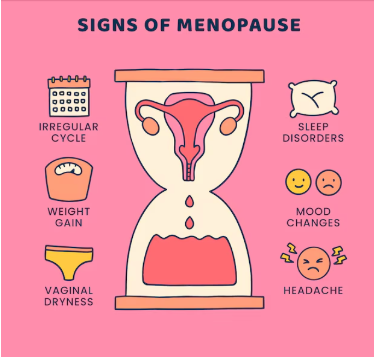By : Geraldus Sigap

Menopause is a natural phase in every woman’s life, but it often arrives quietly. Many women don’t realize that symptoms like trouble sleeping, mood swings, or joint pain can be early signs of menopause. If left unmanaged, these symptoms can significantly affect quality of life.
What Is Menopause?
Menopause is the permanent end of menstrual cycles, defined as no menstruation for 12 consecutive months. It typically occurs between ages 45–55 but can come earlier. It is closely linked to a decrease in estrogen and progesterone levels.
Commonly Overlooked Symptoms of Menopause
Here are some symptoms often mistaken for general health issues:
- Hot flashes – Sudden warmth in the face, neck, and chest, especially at night.
- Night sweats – Waking up drenched in sweat.
- Sleep disturbances (insomnia) – Difficulty falling or staying asleep without clear cause.
- Mood swings – Increased irritability, anxiety, or sadness.
- Low libido and vaginal dryness – Reduced sexual desire and pain during intercourse.
- Unexplained joint or muscle pain
If you experience several of these symptoms, consult a doctor to confirm if they are related to menopause.

Why Do Menopause Symptoms Occur?
The decline in estrogen affects various body systems, including the nervous, muscular, metabolic, and reproductive systems, causing wide-ranging effects from dry skin to mild cognitive impairment.
Examination and Diagnosis
If menopause is suspected, doctors may perform:
- Review of menstrual history and symptoms
- Hormonal blood tests: LH, FSH, and estradiol
- Daily symptom evaluation and impact on daily life
- Early detection is vital to prevent long-term complications such as osteoporosis and heart disease.
How to Manage Menopause Symptoms
Menopause cannot be stopped, but symptoms can be managed effectively through:
- Healthy lifestyle changes: A diet rich in calcium and vitamin D, regular exercise, adequate sleep, and stress management.
- Hormone Replacement Therapy (HRT): For severe symptoms, doctors may consider estrogen/progesterone therapy under strict supervision.
- Natural supplements and phytotherapy: Such as soy isoflavones, evening primrose oil, or black cohosh.
- Psychological counseling: Behavioral therapy or counseling helps with emotional distress.
When to See a Doctor
If menopause symptoms interfere with daily life or begin before age 40 (early menopause), consult a gynecologist. Further evaluation helps determine safe and appropriate treatment. Book an appointment with an obstetrician and gynecology at RS Abdi Waluyo by calling 021-3144989 or using our online booking service.
FAQ
-
At what age do women typically experience menopause?
Usually between 45–55 years old, but it can happen earlier or later depending on genetics, lifestyle, and certain medical conditions.
-
What is the difference between menopause and perimenopause?
Perimenopause is the transition phase leading up to menopause, when hormone levels begin to decline but periods haven’t stopped completely. Symptoms like hot flashes and mood swings often begin here.
-
Can menopause be prevented?
No, it’s a natural process. However, symptoms can be managed through a healthy lifestyle, hormone therapy if needed, and regular doctor visits.
-
Does menopause cause weight gain?
Yes. Lower estrogen levels can slow metabolism and lead to fat accumulation, especially around the abdomen. Balanced diet and exercise help maintain a healthy weight.
-
Do all women need hormone therapy during menopause?
No. Hormone therapy is only prescribed for severe symptoms. Doctors will weigh the benefits and risks based on your medical history.
Resource :
- Singh M, Mostow A, Tuli S. Tonsillitis. StatPearls [Internet]. Treasure Island (FL): StatPearls Publishing; 2024 [cited 2025 Jul 19]. Available from: https://www.ncbi.nlm.nih.gov/books/NBK552590/
- Desai K, Wadhwa R, Shah H. Pediatric tonsillitis: A review. Cureus. 2024 May 21;16(5):e60708. doi:10.7759/cureus.60708. Available from: https://www.ncbi.nlm.nih.gov/pmc/articles/PMC11663262/
- Klug TE. Recurrent tonsillitis: an overview of burden and management. Drug Healthc Patient Saf. 2020;12:1–7. doi:10.2147/DHPS.S235017. Available from: https://pubmed.ncbi.nlm.nih.gov/33095879/
